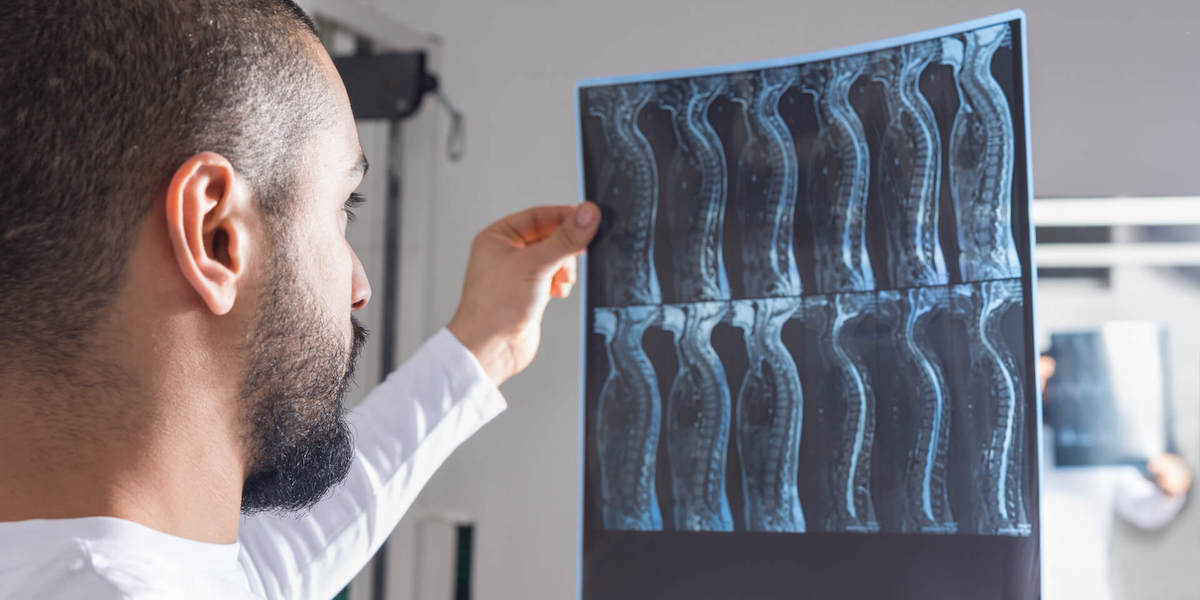Spinal cord injury (SCI) is a serious medical condition that occurs when the spinal cord is damaged. The spinal cord is a long, thin, tubular bundle of nervous tissue and support cells that extends from the brainstem to the lower back. It carries messages between the brain and the rest of the body, controlling movement and sensation. A spinal cord injury can cause permanent changes in strength, sensation, and other body functions below the site of the injury.
In severe cases, spinal cord injuries can lead to permanent disability and loss of function in affected body parts. If you need assistance finding medical professionals to diagnose or attorneys to pursue compensation in Minnesota, CarAccidentAttorney.com can help.

Causes of Spinal Cord Injury
The most common causes of spinal cord injury in Minnesota are trauma and disease. Trauma is the leading cause of SCI, accounting for about 55% of cases. Motor vehicle accidents, falls, and sports injuries are the most common causes of traumatic SCI. Diseases that can cause spinal cord injury include cancer, infections, and autoimmune disorders.
Types of Spinal Cord Injury
SCI can be classified as complete or incomplete, depending on the extent of damage to the spinal cord. A complete SCI means that there is a total loss of sensation and movement below the level of the injury. An incomplete SCI means that some function remains below the level of the injury. The degree of completeness is determined by the American Spinal Injury Association (ASIA) Impairment Scale.
In addition to completeness, SCI can also be classified according to the level of the injury. The spinal cord is divided into five regions: cervical, thoracic, lumbar, sacral, and coccygeal. Each region controls different parts of the body, so the location of the injury determines the type and severity of the symptoms.
Treatment and Rehabilitation for Spinal Cord Injury
The treatment and rehabilitation of spinal cord injuries depend on the type and severity of the injury. The goals of treatment are to prevent further damage to the spinal cord, stabilize the patient, and provide supportive care. In some cases, surgery may be necessary to remove pressure on the spinal cord, stabilize the spine, or repair damaged tissue.
Rehabilitation for spinal cord injury often involves a team of healthcare professionals, including physical therapists, occupational therapists, and speech therapists. The goals of rehabilitation are to improve function, reduce complications, and promote independence. Rehabilitation may include exercises to improve strength and flexibility, assistive devices to improve mobility, and psychological support to cope with the emotional impact of SCI.
How a Lawyer Can Help
If you or a loved one has suffered a spinal cord injury, it is important to seek legal advice as soon as possible. A lawyer who specializes in spinal cord injuries can help you navigate the complex legal and medical issues involved in your case.
Here are some ways a lawyer can help:
Evaluate Your Case
A lawyer can evaluate the strength of your case and inform you of your legal rights and options. They can help you determine if you have a viable claim for compensation for your injuries, medical expenses, and other damages.
Additionally, they can help determine the value of your losses, which will be essential when negotiations begin.
Investigate the Cause of the Injury
A lawyer can investigate the cause of your spinal cord injury and determine who may be responsible. If your injury was caused by the negligence or wrongdoing of another party, such as a driver, property owner, doctor, or manufacturer, you may be entitled to compensation.
Additionally, an attorney can consult with expert witnesses to get a better understanding of your injury and how it may impact you in the long term.
Negotiate with Insurance Companies
A lawyer can negotiate with insurance companies on your behalf to ensure that you receive a fair settlement for your injuries. Insurance companies may try to offer a low settlement or deny your claim altogether, but a lawyer can use their knowledge and experience to fight for your rights.
Represent You in Court
If a settlement cannot be reached, a lawyer can represent you in court. They can present your case to a judge or jury and argue for the compensation you deserve. A lawyer can also handle the legal procedures and paperwork involved in a lawsuit so you can focus on your recovery.
Work with an Attorney and Medical Directory
After suffering a spinal cord injury, you may feel like your life has been turned upside down. While a lot of uncertainty may lie ahead, experienced medical professionals and lawyers can help alleviate some of the stress you may be feeling.
CarAccidentAttorney.com is an attorney and medical directory that can help you find reputable professionals in your area of Minnesota. If a spinal cord injury has thrown your life into disarray, contact us today to find experts nearby.
